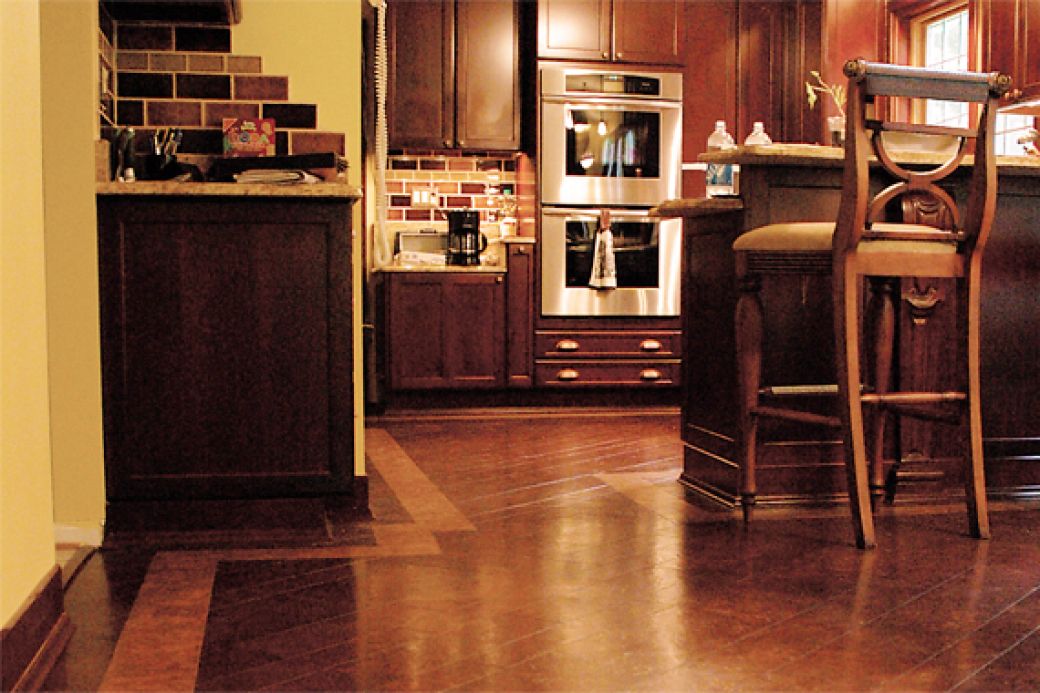If you are wondering which of your kitchen flooring options are green, you need to first ask: What makes for a green kitchen floor? Linoleum flooring and cork flooring are two dandy options. Both:
By the way, steer clear of vinyl, because its manufacture is tough on the environment—and the stuff it releases into the air is hard on your health. It doesn't pass the durability test either:
- It's easily damaged by sharp objects.
- The surface pattern can quickly fade.
Easy-to-Clean Linoleum Flooring Looks Like a Million Bucks
| Cost | $2 to $4 per sq.ft.; installation adds $5 to $7 per sq.ft. |
| Lifespan | 30+ years with proper maintenance |
| Brands include | Marmoleum Armstrong |
Forget what you think you know about linoleum flooring—it's not your grandma's kitchen floor anymore. And don't confuse it with vinyl, which is a petroleum product.
Linoleum is made from renewable, biodegradable materials including cork and linseed oil. Linseed oil can off-gas, so keep that in mind if you're sensitive to irritants. But it doesn't present the health hazard that vinyl does.
Cleaning linoleum flooring needn’t be an ordeal; it's easily washable with soap and water. And it now comes in chic patterns and colors that complement contemporary decor. It's even naturally anti-static, which means it repels rather than collects dirt.
Linoleum flooring comes in tiles or sheets. Make sure your installer seals the seams, so gunk doesn’t accumulate.
Linoleum flooring tolerates traffic and offers some cushioning underfoot. It’s resistant to moisture but susceptible to staining, so some manufacturers add a coating to protect against spills and scratches. Without this protection, linoleum flooring has to be cleaned and polished every two years.
Comfy Cork Can Be Harvested Without Killing a Single Tree
| Cost | $2-$6 per sq.ft.; installation adds $5 to $10 per sq.ft. |
| Lifespan | 50+ years (high-density cork) with proper maintenance |
| Brands include | Expanko Globus Cork |
Cork flooring is a sustainable product made from tree bark that grows back and can be harvested repeatedly. Plus, the industry is carefully regulated to reduce environmental impact.
Look for cork flooring labeled "high density"—it's more durable. Cork flooring is waterproof and slightly soft underfoot, which makes it both moisture-resistant and comfy.
Got light sleepers and a klutz in the house? Cork flooring absorbs ambient sound, and it flexes a little when objects are dropped on it, making it less likely than a hard surface to scratch.
Cork flooring is made in 12x12-inch tiles and 1x3-foot planks with a surface that's textured and slip-resistant.
Damp mopping is better than the traditional soap and water treatment. Follow your manufacturer's instructions, but whatever you'd use on a hardwood floor will generally work for cork. Treat cork flooring with a sealant every 3 to 4 years to prevent scratches and stop moisture from penetrating seams between tiles.
Karin Beuerlein contributed to this article.
Related:
